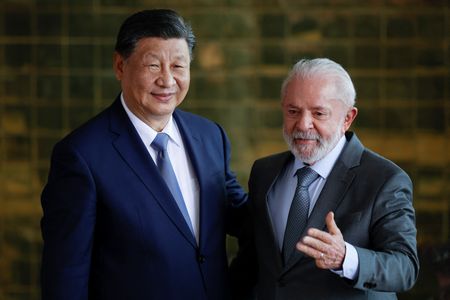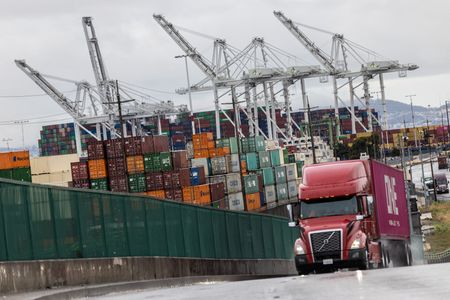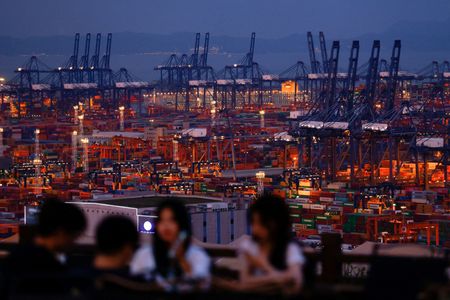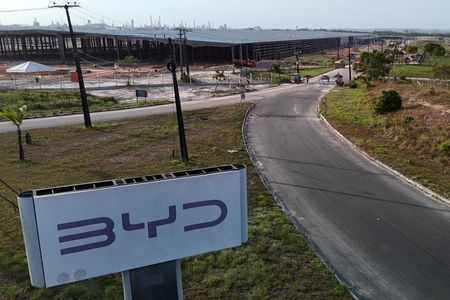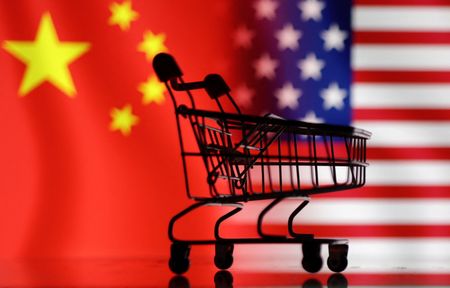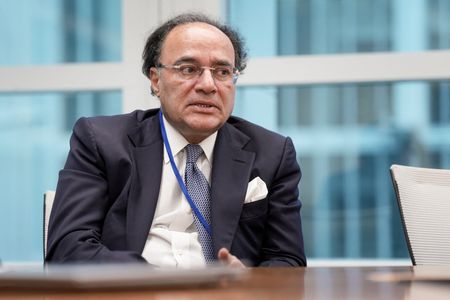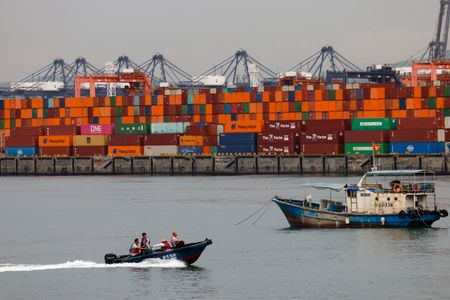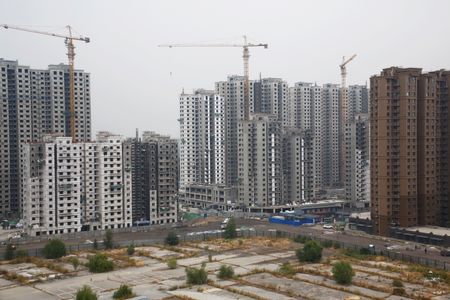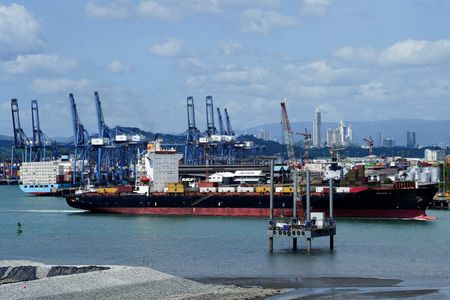By Lisandra Paraguassu and Eduardo Baptista
BRASILIA (Reuters) -Brazilian officials on Monday touted President Luiz Inacio Lula da Silva’s meeting with China’s President Xi Jinping in Beijing as a chance to lure investment and boost Brazilian exports to a country frustrated with U.S. President Donald Trump’s volatile tariff policies.
At a business forum, Lula cheered more than $4.5 billion of upcoming Chinese investments in Brazilian sectors ranging from automaking and renewable energy to pharmaceuticals and semiconductors.
“If it’s up to my government, our relationship with China will be indestructible,” Lula told business leaders in Beijing.
His visit is also expected to yield major investments in railways and other farm export infrastructure, officials said. Brasilia hopes to ramp up exports of grains and other goods now supplied by the U.S. to China, which have become costlier in a damaging trade war between Washington and Beijing.
“Brazil is looking to … expand the ties of friendship and trade with China, generating great reciprocal achievements, especially in a moment of trade instability caused recently by the United States,” Brazilian Agriculture Minister Carlos Favaro told the business forum in Beijing.
Although the U.S. and China reached a deal on Monday to temporarily reduce tariffs, the remaining trade barriers and distrust have reinforced bets on a more reliable partnership between Beijing and Brasilia.
Lula’s four-day visit to China includes his third bilateral meeting with Xi since the Brazilian president took office in 2023. Other leaders, including Chile’s President Gabriel Boric and Colombia’s Gustavo Petro, have also been visiting Beijing for meetings between Chinese officials and the Community of Latin American and Caribbean States, CELAC.
The Lula-Xi meeting on Tuesday follows elevation of the two nations’ diplomatic relations during a meeting last November in Brazil, where the leaders inked over 40 agreements on myriad sectors, including infrastructure, energy and agribusiness.
On Monday, officials hailed early fruits of those accords, including a $1 billion investment by China’s Envision Group in Brazilian production of renewable aviation fuel from sugarcane.
Chinese delivery firm Meituan announced an investment of 5 billion reais to enter the Brazilian market with its Keeta app, according to government trade and investment agency ApexBrasil. CGN Power also detailed plans to spend 3 billion reais on a wind, solar and energy storage hub. Great Wall Motor is preparing to invest 6 billion reais ($1.1 billion) in Brazilian car factories.
Chinese semiconductor company Longsys announced an investment of 650 million reais to expand its capacity in Brazil. Longsys, China’s largest memory chipmaker by revenue, acquired a Brazilian subsidiary two years ago, now called Zilia, which could help to avoid U.S. tariffs and export controls targeting China-made chips.
Lula also met on Monday with the CEO of Chinese arms maker Norinco.
RAIL PROJECTS
Brazil’s Transportation Minister Renan Filho told Reuters Chinese investors were interested in several rail projects in Brazil, including proposals to link farm and mining regions with ports such as Barcarena, Açu and the new Chinese-operated port in Chancay, Peru.
“We will sign all projects that have road and rail synergy with the potential to increase exports to China, especially agriculture, but also other things, such as mining,” he said.
The minister conceded that the plans had been presented to Chinese investors a few times over the years, but he suggested that the two countries’ relationship is now mature enough for projects to move forward.
He said the countries reached a firmer agreement last year about their relationship, after years in which Chinese diplomats fruitlessly tried to recruit Brazil for the Belt and Road Initiative, China’s global infrastructure program. Last November, the two agreed instead to find “synergies” between China’s plans and Brazil’s own development programs.
China is Brazil’s biggest export market and has been one of the biggest foreign investors in Latin America, though it has been more cautious in recent years. According to a survey by the Brazil-China Business Council, Chinese investments in Brazil totaled $1.73 billion in 2023, a 33% increase from the previous year, but still the second lowest since 2007.
Tulio Cariello, the council’s director of research, said transportation and particularly rail had enormous potential to attract Chinese investments, though in the past those projects have stalled with bureaucratic and budget obstacles.
“I see that there is a lot of Chinese interest,” he said, adding that the two countries are better prepared to overcome obstacles now. “There is now much more comprehensive knowledge about Brazil in China than there was before.”
($1 = 5.6793 reais)
(Report by Lisandra Paraguassu; Writing by Manuela Andreoni; Editing by Brad Haynes and David Gregorio)

